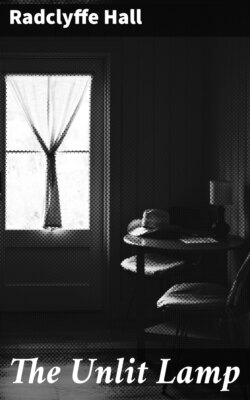Читать книгу The Unlit Lamp - Radclyffe Hall - Страница 22
На сайте Литреса книга снята с продажи.
1
ОглавлениеTable of Contents
THE weeks dragged on; Colonel Ogden might recover, but his illness would of necessity be a long one, for his heart, already weak, was now disposed to stop beating on the least provocation. Joan worked with furious energy. Elizabeth, confident of her pupil, protested that this cramming was unnecessary, but Joan, stubborn as always, took her own line. She felt that work was her only refuge, the only drug that, temporarily at all events, brought relief.
It was now the veriest torture to her to be in her mother's presence, to be forced to see the tired body going on its daily rounds, to hear the repeated appeals for sympathy, to see the reproach in the watchful eyes.
But if the days were unendurable, how much worse were the nights, the nights when she would wake with a sudden start in a cold sweat of terror. Why was she terrified? She was terrified because she feared that she did not love her mother, and one night she knew that she was terrified because, if she could not love her mother, she might grow to love someone else instead--Elizabeth for instance. The hydra grew another head that night.
Elizabeth, the ever watchful, became alarmed at her condition. Joan, haggard and pale, distressed her; she could not get at the bottom of the thing, for now Joan seemed to avoid her. Yet she felt instinctively that this avoidance did not ring true; there was something very like dumb appeal in the girl's eyes as they followed her about. What was it she wanted? There was something unnatural about Joan these days--when she talked now, she always seemed to have a motive for what she said, she seemed to hope for something from Elizabeth, from Milly even; to hang on their words. Elizabeth got the impression that she was for ever skirting some subject of which she never came to the point. She felt that something was being demanded of her, she did not know what.
There were good days sometimes, when Joan would get up in the morning feeling restored after a peaceful night. Her troubles would seem vague like a ship on a far horizon. Then the reaction would be exaggerated. Elizabeth was not reassured by a boisterously happy Joan, and was never surprised when a few hours would exhaust this blissful condition. Something, usually a mere trifle, would crop up to suggest the old Horror. Very quietly, as a rule, Joan's torments would begin, a thought--flimsy as a bit of thistledown, would light for an instant in her brain to be quickly brushed aside, but like thistledown it would alight again and cling. Gradually it would become more concrete; now it was not thistledown, it was a little stone, very cold and hard, that pressed and was not so easy to brush aside. And the stone would grow until it seemed to Joan to become a physical burden, crushing her under an unendurable load, more horrible than ever now because of those hours of respite.
Elizabeth coaxed and cajoled; she wanted at all hazards to stop Joan from working. She let down the barrier of her calm aloofness and showed a new aspect of herself to her pupil. She entreated, she begged, for it seemed to her that things were becoming desperate. At last she played her trump card, she played it suddenly without warning and without tact, in a way that was characteristic of her in moments of deep feeling. One day she closed her book, folded her hands and said:
'Joan! If you loved me you couldn't make me unhappy about you as you do. Joan, don't you love me?'
For answer Joan fled from the room as if pursued by a fiend.
'Do I love her? Do I? Do I?' There it was again--this time for Elizabeth. Did she love Elizabeth and was that why she did not love her mother? Here was a new and fruitful source of self-analysis; if she loved Elizabeth she could not love her mother, for one could not really love more than one person at a time, at least Joan was sure that she could not.
